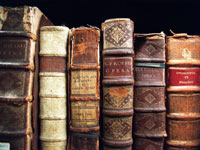Anna Amalia library reopens
Three years ago a catastrophic fire consumed some 50,000 historical books in Germany's famed library. On Wednesday Anna Amalia Library, part of a UNESCO World Heritage site, reopened.

The fire, sparked by an electrical fault, gutted the 16th-century rococo palace that houses the library on Sept. 2, 2004.
Among the volumes destroyed were a collection of 18th-century musical works donated by Duchess Anna Amalia and a renowned book collection gathered by the first librarian, Daniel Schurzfleisch, who brought them to the library on 35 horse-drawn carts in 1722.
A daisy-chain of people staged a dramatic rescue, managing to save from the flames some 6,000 historical tomes, including a 1543 Martin Luther Bible.
Though the doors officially reopened on Wednesday - the anniversary of Duchess Anna Amalia's birthday in 1739 - German President Horst Koehler noted that the restoration of all 62,000 books damaged in the fire would not be complete until 2015.
"We have reached only the first milestone today," Koehler said. "We still have great treasures to save and recover."
The €12.8 million (US$18.21 million) restoration of the palace building was finished last week. While it includes many modern additions - like a high-tech sprinkler system - it carefully hid them so as not to disturb efforts to return the building to its original appearance.
The total estimated cost of books destroyed or damaged is €67 million (US$95 million). They were part of an overall collection of some 1 million volumes belonging to the library, held at several places in Weimar, a city about 250 kilometers (150 miles) southwest of Berlin.
The collection centers on German literature from between 1750 and 1850. During that time, Germany's most revered writer, Johann Wolfgang von Goethe, lived in Weimar, where his house remains a major tourist attraction.
Another German literary great, Friedrich Schiller, best known for his classical dramas, spent the last years of his life in Weimar and died there in 1805.
While the state of Thuringia and the federal government paid for most of the restoration work to the building, nearly €21 million (US$29.88 million) in donations from Germany and around the world has been put toward the restoration of the precious books.
"This unified endeavor is an extraordinary and shining example of the cultural engagement in our country," Koehler said. "We can all be proud of that."
This year is the 200th anniversary of the death of Anna Amalia who, with her son, Duke Carl August, helped put Weimar on Europe's cultural map in the late 18th century.
Seeking a tutor for her son, she brought in Christoph Martin Wieland, a well-known poet and translator of Shakespeare's works, and also helped draw both Goethe and Schiller to the city. It was also Anna Amalia who converted the palace into a library and made it open to the public.
The library was added to the United Nations Educational, Scientific and Cultural Organization's World Heritage List in 1998 as part of "classical Weimar."
Subscribe to Pravda.Ru Telegram channel, Facebook, RSS!


